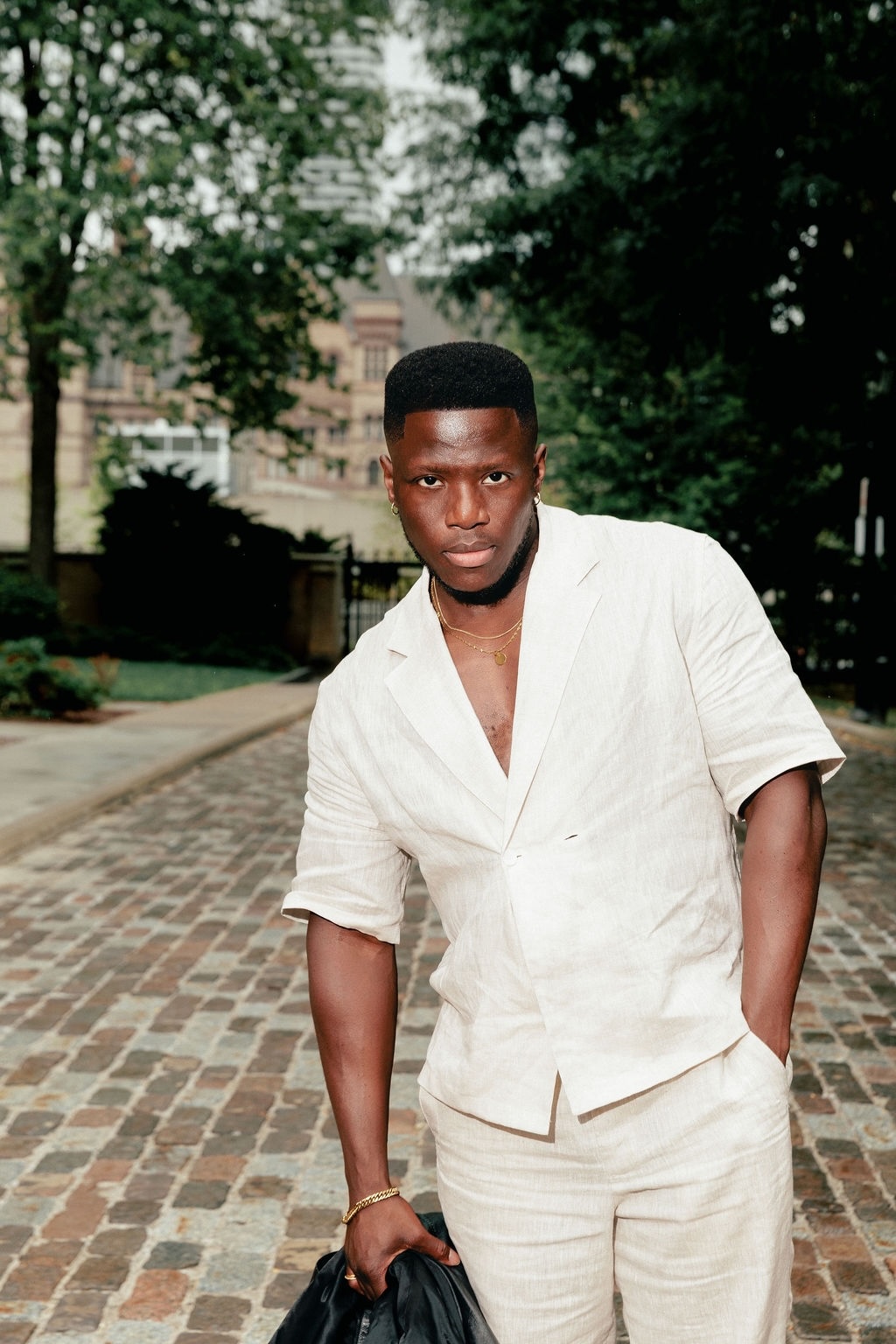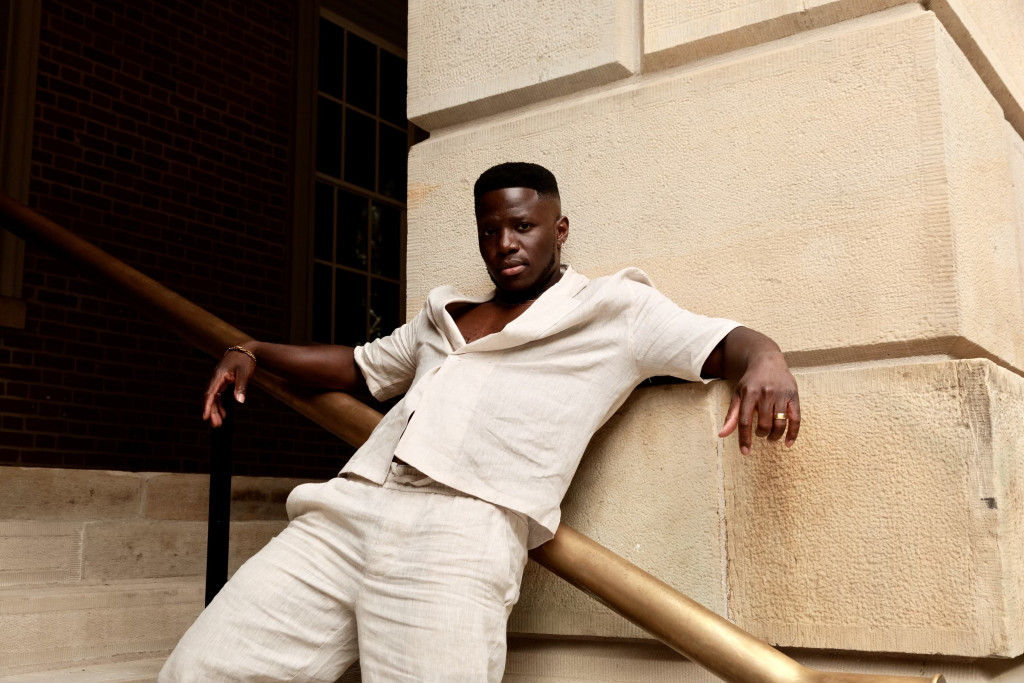Adrian Walters carries himself like someone who understands the assignment, not the Hollywood kind, but the spiritual one.
The Canadian-born actor, storyteller, and producer moves through his craft with an awareness that art isn’t just performance; it’s purpose.
Whether portraying a conflicted soldier in Out Standing or embodying generational trauma in It Comes In Waves, Walters approaches every role with a rare mix of faith, discipline, and grace.
Raised in Toronto and grounded by his faith, Walters’ artistic foundation began on the stage, where his gift for emotional truth first caught the attention of critics.
His breakout performance as Jesus in Judas Noir, an adaptation of Stephen Adly Guirgis’ The Last Days of Judas Iscariot, earned him a Dora Mavor Moore Award nomination, Canada’s equivalent of a Tony.
On television, Walters has appeared in The Handmaid’s Tale (Hulu), Star Trek: Discovery (Paramount+), The Porter (CBC), and Dare Me (Netflix), each performance distinct, but united by a quiet intensity that draws you in.
In film, he’s made history. His first two features, It Comes In Waves and Out Standing, premiered to critical acclaim, earning Audience Choice Awards and multiple standing ovations from Miami to Toronto. Walters became the first actor in Cinéfest Sudbury’s history to star in two films at the same festival.
But what stands out most about Walters isn’t the résumé, it’s the reverence. He speaks about his process with the language of a man in conversation with something higher.
Prayer anchors his preparation, gratitude fuels his performances, and empathy guides his storytelling. His ability to honor real people and lived experiences, particularly in projects inspired by true events, has earned him both critical respect and personal fulfillment.
Beyond the camera, Walters is also shaping culture as the co-founder of BDB Productions Inc., one of the companies behind It Comes In Waves. Through BDB, he’s committed to developing projects that center underrepresented voices and reimagine the stories that define our shared humanity.
It’s a full-circle evolution, the actor becoming the architect, the performer becoming the producer, all while maintaining a deep sense of humility and gratitude.
We caught up with Walters to talk about faith, process, responsibility, and how he continues to stay grounded while taking on roles that challenge both heart and spirit.

What did theatre teach you about your craft that still informs the way you work today?
Just overall, a deeper understanding of my body as an instrument and a trust and confidence in my instincts. Including an increased hunger and love for rich text, which invokes not just the voice but the soul.
When you’re preparing for a role, what rituals or practices help you get into character and stay grounded during intense performances?
First, I pray, asking God to reveal everything I’ll need to tell the story and to help me stay out of my own way. The process itself changes every time, equally exciting and humbling. It always begins with reading the script multiple times, which informs everything that follows. Sound is also another anchor I like to lean on.
Out Standing explores resilience and loyalty within a military backdrop. What part of Daniel’s journey resonated most with your own life experiences?
Honestly, what resonated most with me was Daniel’s joy. God has blessed me with the ability to actually enjoy every step of the journey, no matter what it looks like. So I get just as much satisfaction cheering others on as I do being on stage myself, and that mindset has helped shape my path and contributed to the success I’m experiencing today.
There’s also a lot of hidden heroes in my journey that have contributed in their own ways, and it ain’t lost on me.
When portraying a real person or a story inspired by true events, do you feel a greater responsibility in your performance?
Of course, man, how could you not? Haha. Interestingly enough, I kind of enjoy that pressure. My goal has always been to tell stories that feel bigger than me, and I get to do that through projects like Out Standing and It Comes In Waves.
When I stepped into the shoes of Daniel and Akai, my aim wasn’t to mimic anyone but to capture the essence and soul of these people. If I achieve that, I’ve done my job. I’m grateful I got to meet the people who inspired Daniel’s character. Hearing which moments in the story belonged to them personally and having them tell me I got it right was an incredible feeling. That’s where my responsibility lies, with them.
The same goes for Akai. We had two Rwandan genocide survivors on set as authenticity consultants, helping us stay true to the story. Watching the film with Marshall in Miami was a gift. Especially when he said, ‘Thank you, man, you told my story.’
Moments like that are humbling. They remind me I’m on the right path and help me to ultimately step away from a project when it’s done, so I could focus on what’s next.
In It Comes in Waves, you play Akai in a story rooted in real historical trauma. How did you prepare emotionally to carry such a heavy narrative?
Lots of prayer, and by educating myself on it, I immersed myself in everything I could find from books, sounds, images, and videos of genocide survivors. Their eyes, in particular, revealed a lot to me. The deep mixture of pain and lost innocence that lives within them opened me up to a deeper understanding of how trauma lives in the body, specifically Black bodies, from high-functioning to low-functioning.
The film’s authenticity is heightened by having genocide survivors on set. How did their presence shape your performance?
Their presence set a heightened tone of responsibility for me personally and also stirred a kind of delicate curiosity within me, because in many ways, they had the answers to my test.
Sometimes, just talking to them about regular things would naturally lead to them opening up and sharing pieces of what they experienced. I would just listen, not prying, just being present, because I didn’t want to awaken anything painful they’d have to carry afterward. I wanted to be extra respectful.
Then trust that whatever came of those moments would flow through me on the days of filming.
You co-founded BDB Productions Inc. How has stepping behind the camera as a producer influenced the kinds of stories you want to tell on screen?
Producing heightens your awareness of all the little miracles that have to align just for someone to say “action.” It gives you a deeper appreciation for every moving part and reminds you that filmmaking is never a solo act.
At BDB Productions, we’re committed to championing underrepresented communities and telling stories that excite and stretch us and our imaginations as artists. We’re cinephiles at heart, always looking to create space for incredible talent that hasn’t yet been seen, and producing gives us the freedom to bring those ideas to life in ways that sometimes acting alone can’t.
Both of your recent films have been recognized with Audience Choice Awards. What does that kind of reception mean to you, knowing audiences are deeply connecting with your work?
It’s humbling, man. Making a film can be strenuous, and sharing it is vulnerable. So an Audience Choice award shows our work is connecting, and affirming that we’ve created something meaningful. I’ve always aimed for my work to add value not just to my life, but to others. So it lets me know I’m on the right path and in the kinds of projects I set out to be in.
You’ve spoken about “answering the calling on your life.” What do you see as your greater calling through acting and storytelling?
Let my light shine and let them know where it came from.
While using my work to help the world move toward a healed perspective of how we see one another.
What advice would you give to young actors, especially those from underrepresented backgrounds, about carving their path in this industry?
Keep God first, lean into your uniqueness, keep learning, and find a solid community of people you can genuinely trust and lean on. That actually wants to see you win.
Looking ahead, what kinds of roles or stories are you most excited to explore?
I’m elated to take on roles that excite me, challenge me, and help me grow as an actor and as a person. I’m drawn to stories that are meaningful and, God willing, have massive impact, reach, and staying power. I love working with filmmakers like Melanie or Fitch who take me on an adventure and make bold choices, with enough heart to reexamine where we’ve been and enough imagination to dream about where we can go. At the end of the day, I just want to be a part of work that helps leave this thing better than we found it.
I admire the careers of Robert De Niro, Denzel Washington, and Leonardo DiCaprio. That’s the standard I’m pursuing; God willing, I hit it.
I’d love to play a soulful musician from the ’60s who loses his way but finds it again, something in the spirit of Walk the Line, A Star Is Born, or Ray. I’m also drawn to transformative roles like Malcolm X, Raging Bull, and on the lighter side, I’d love to do a grounded rom-com or co-lead a big blockbuster that’s captivating to watch with my family, that’d be fun.




